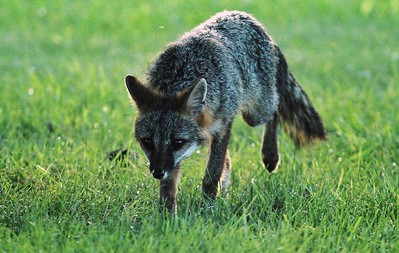What are the laws for hunting fox in Texas? This article covers many of the fundamental laws you will need to know to get started. It also provides information such as seasons, harvest limits, and required permits for bobcat hunting in Texas. It is not a legal document and is not intended to cover all hunting laws and regulations.

In Texas, fox hunting season is open all year. A valid hunting license is required, but there is no bag limit. Fur-bearing animals taken as a result of recreational harvest may not be sold. Public hunting lands may have restrictions.
Purchase a Texas hunting license here.
Check out all the Texas hunting seasons.
First time hunting fox? Check out these articles:
Read: How to call in a fox.
Read: How to use tracks and scat to hunt a fox.
Related: Read the laws for hunting coyotes in Texas.
Related: Read the rules for hunting bobcats in Texas.
General rules and laws for hunting fox in Texas.
Is it legal to hunt bobcats in Texas at night?
Fox hunting at night is legal. If hunting at night, please get in touch with your local game warden as a courtesy.
Electronic callers. All mouth, hand, and electronic callers are legal to use when hunting fox in Texas.
Lights, night vision, infrared, and thermal riflescopes. Use of these devices is legal, where night hunting is permitted.
Related: What is a perfect night vision riflescope for fox hunting at night?
Related: A review of the ATN Thor 4 thermal riflescope.
Using electronic callers and decoys when hunting fox in Texas.
Electronic calls, mouth calls or other types of game calls or predator calls may be used when hunting fox. Mechanical/ electronic decoys may be used as well.
While electronic callers are expensive, mouth and hand callers are cheaper but harder to use.
Read this article and watch the video to learn how to use a closed reed rabbit squealer.
Follow along as call manufacturer Brian Rush shows you three open reed calls you can learn and use today.
You can check the price for an electronic caller on Amazon.
Decoys are legal. You can read about some highly effective but inexpensive ($20) decoys here.
Suppressors. The use of suppressors/silencers is legal for persons possessing the required federal license from the United States Department of Treasury. Hunters using these devices must have proof of such license on their person.
How much does it cost to hunt bobcats in Texas.
The price for a guided fox hunt in Texas as of today ranges from $1,500 to $2,250 per person. Prices depend on a variety of factors (accommodations, number of hunting days).
You can check a few services with published prices online here:
Please note: There is no relationship between these services as Thepredatorhunter.com.
Can you shoot a fox on your property in Texas?
Yes, landowners or their agents may take nuisance fur-bearing animals in any number by any means at any time on that person’s land without the need for a hunting or trapping license. However, fur-bearing animals or their pelts taken for these purposes may not be retained or possessed by anyone at any time except licensed trappers during the lawful open season and possession periods.
Nuisance fur-bearing animals may be captured and relocated if the person has received authorization from the department and the owner of the property where the release will occur. A monthly report is required and must be submitted to the department on number and kind of fur-bearers captured, location of release site, name and address of person authorized to release.
Unlawful activities when hunting fox in Texas.
It is unlawful to:
- Knowingly discharge a firearm causing a projectile to cross a property line, unless the person owns both sides of the property line or has obtained written permission from the owner of any land crossed by the projectile.
- Discharge a firearm on or across a public road or hunt from public roads.
- Use a computer, or operate a facility that uses a computer, to assist in remote firearm or archery hunting, if the animal being hunted is located in Texas.
- Hunt with the aid of artificial light of any form that casts or reflects a beam of light onto or otherwise illuminates a game animal or bird; exception: hunters with legal blindness, or hunters who have a documented permanent physical disability that prevents them from using traditional firearm sighting devices may use laser sighting devices.
- Hunters with blindness must possess a physician’s signed statement attesting to legal blindness; and be assisted by a licensed hunter at least 13 years of age who is not legally blind. Legal blindness is defined in section 62.104 (c) of the Texas Government Code.
- Hunter education and licensing requirements still apply to hunters with legal blindness, hunters with a documented permanent physical disability, and persons assisting hunters with blindness or other disability.
- All hunters may use battery-powered scoping devices that project a light or dot only inside the scope or pin sight lights on archery equipment.
- Use traps to hunt game birds or game animals.
- Use dogs to hunt deer in this state.
- No person may possess a shotgun and buckshot or slugs while in the field with dogs on another person’s land during an open deer season in Angelina, Hardin, Jasper, Nacogdoches, Newton, Orange, Sabine, San Augustine, Shelby, and Tyler counties.
- No more than two dogs may be used to trail a wounded deer in all counties; however, in Jasper, Newton, Sabine, and San Augustine counties, a person may trail a wounded deer with no more than two leashed dogs held by the person in control of the dogs. A “wounded deer” is a deer leaving a blood trail.
- Use aircraft (including drones, except by activity-specific permit) to hunt, locate (including wounded animals), manage, harass, drive, trap or photograph any wild animal.
- Hunt on Public Hunting Areas without the required permits.
- Hunt in a subdivision on lots 10 acres or less in an unincorporated area of a county if prohibited by local ordinance. Contact local county clerk and ask about §235.022, Local Government Code.
- Hunt anywhere by means or methods that have been prohibited by county or city ordinance.
- Hunt on any area named as a wildlife sanctuary, nesting, or propagation area.
- Hunt in state and/or national parks or refuges except during scheduled hunts or under other special state or federal policies.
- Hunt any wild animal or wild bird on or over privately-owned land that is submerged under public freshwater due to seasonal or occasional inundation or submerged under saltwater above the mean high tide line. The property must be posted to indicate that hunting is prohibited.
- Hunt any wild animal or wild bird, including exotic animals, on foot or from a vehicle on any public road or road right- of-way, or a boat on public water, except that migratory waterfowl may be hunted from a boat or any floating craft (except a sinkbox) under certain conditions.
- Possess a firearm if a convicted felon, with limited exception. Texas law allows the possession and use of a muzzle loading firearm if it is an antique or curio firearm manufactured before 1899, or is a replica of an antique or curio firearm manufactured before 1899 that does not use rimfire or centerfire ammunition. For questions regarding the possession and use of firearms by convicted felons, refer to Texas Penal Code Ch. 46 and/or seek guidance from legal counsel.



